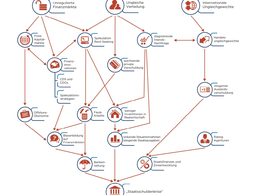Taming inflation? What are the implications of prolonged inflation?
The Sound of Economics, Bruegel, 2022
The podcast discusses how to deal with the rising inflation and presents a comparative perspective between the US and the EMU. Basically the speakers discuss whether we are heading to a stagflation in Europe similar to the 1970s and they compare the macroeconomic dynamics in the United States vs. the EMU. They mention that in the US, economic growth and inflation have a co-movement as expected by textbook economics, while in the EMU they hit in opposite directions, meaning slow growth and rising inflation. While in the EMU, the supply side plays the main role, namely rising inflation is mainly attibuted to the rising energy and food prices, however in the US, the demand side of inflation also partly plays a role due to the large fiscal stimulus in the US. They also compare the labour market and wage growth in the two regions, the possible second round effects of rising inflation, like wage-price spirals and, finally, the restricted power of the monetary policy to effect the cost inflation and alternative policy tools, institutional differences of Federal Reserve and the ECB.
Comment from our editors:
The podcast offers a good overview and the debate about the recent macroeconomic dynamics, namely on inflation, economic growth rate and labour market from a comparative perspective juxtaposing the US and the EMU. The speakers discuss the role and the powers of monetary policy in a situation of supply side inflation and slow growth.
Go to: Taming inflation? What are the implications of prolonged inflation?







